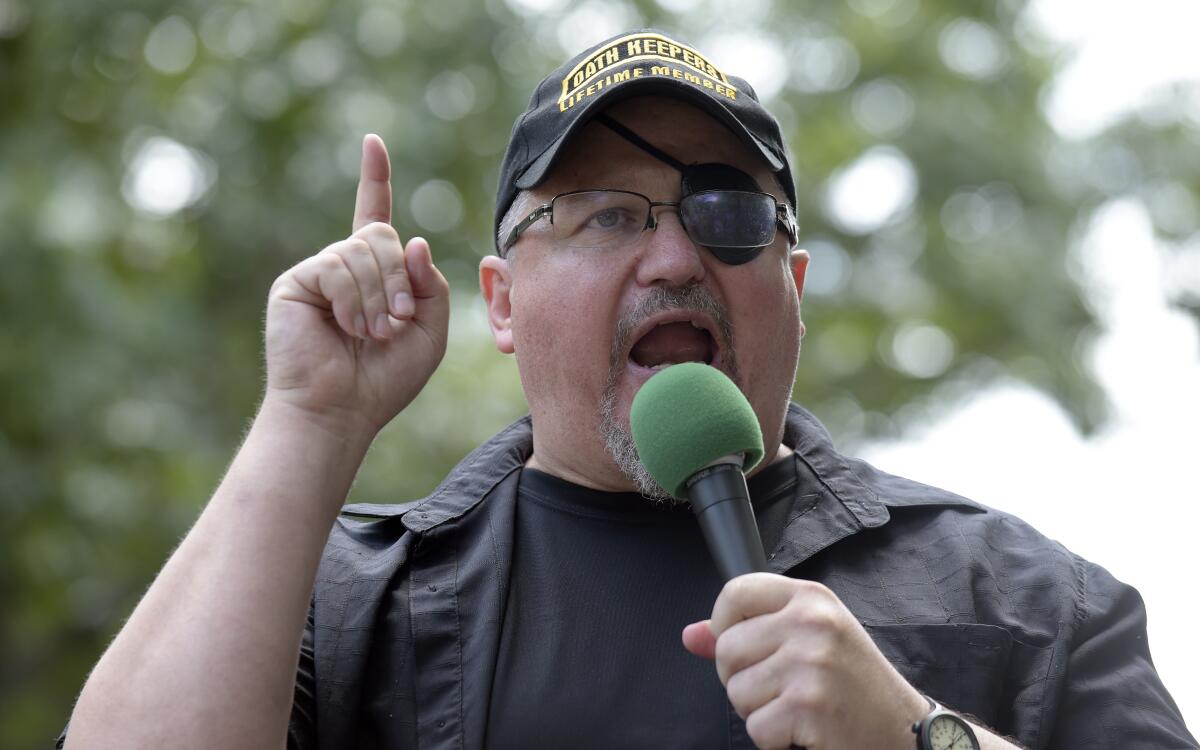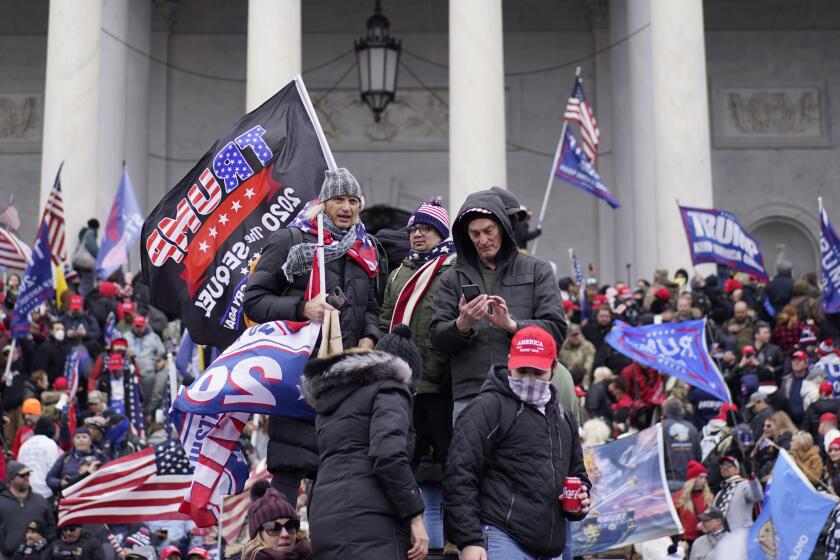Ripples for years to come: What the Jan. 6 cases mean for the judicial system

- Share via
WASHINGTON — The nearly 900 Capitol insurrection-related arrests moving their way through the court system make up an average of 40% of all appearances on the District of Columbia District Court calendar each week.
Alongside the routine federal cases the U.S. District Court for the District of Columbia would otherwise handle — dealing with murder, kidnapping, fraud, drug trafficking and child pornography, among other crimes — are a flood of status and sentencing hearings, evidence negotiations, jury selection proceedings and trials for those arrested across the country for their actions on Jan. 6, 2021.
There’s little flexibility in the schedule to accommodate delays, and those that inevitably happen can reverberate through the system, affecting other criminal and civil cases.
“Jan. 6 has created a massive traffic jam” on the court calendar, Judge Amit Mehta said in early September when he denied Oath Keepers founder Stewart Rhodes’ request to delay his trial for 90 days to bring on a new lawyer. If the trial didn’t occur as planned, the judge said, Rhodes and his co-defendants would probably have to wait until next summer before Mehta could fit their multi-week proceedings into his schedule.
While many defendants have taken plea deals, about half are still making their way through the court system. In an Oct. 6 statement, the Justice Department said that 412 people had pleaded guilty to Jan. 6-related crimes and 26 had been found guilty at trial.
And though the number of arrests has slowed, the Justice Department still announces multiple new arrests each week, and hundreds more rioters have been identified but not yet charged. Federal prosecutors have told D.C. District Court Chief Judge Beryl Howell that it’s “not an unreasonable expectation” that more than 2,000 cases could be filed.
Resources have been moved to Washington to help. The Justice Department has tapped prosecutors and investigators from across the country to help filter through evidence and bring cases in the D.C. District Court. Public defenders from nearly every state have been recruited to ensure defendants have representation, and lawyers have been tapped to provide services pro bono.
The department has also asked Congress to approve an additional $34 million this year to help cover the cost of the prosecutions.
But judges cannot pick what comes across their desk. And there are a finite number of judges on the D.C. court, where all of the Jan. 6 cases are being heard, and there is limited time in which to schedule those cases.
Additional judges cannot be recruited from other districts to help those on the D.C. court, which includes 14 district judges and seven judges who are on a form of partial retirement known as senior status. There was already significant backlog in the federal court system before Jan. 6 due to delays caused by the COVID-19 pandemic and other factors.
“It wouldn’t surprise me if there are other types of cases and investigations that are either not getting formally charged or being delayed in their investigation because of the Jan. 6 cases,” said Loyola Law School professor Laurie Levenson.
Processing an avalanche of evidence, including cellphone records, police radio and body camera footage, along with videos and photos rioters posted on social media, had already caused substantial delays. The government has tried to make much of that information available to every defendant’s legal team through a single database — a process that took over a year — so that defendants cannot argue they didn’t have access to evidence that might have proven their innocence.
Recognizing the sheer scope of evidence and the number of cases, judges have generally been willing to give prosecutors and defense teams ample time to prepare for trials, but there have been indications — such as Mehta‘s refusal to delay the Oath Keepers trial again — that the jurists are only willing to go so far.
“Given the number of cases, it’ll be more difficult for defendants to engage in gameplay when the courts do not have the patience, and frankly the flexibility, to just let cases go on and on,” Levenson said. “The judges have adopted an all-business attitude, because that’s the only way to keep things on the track.”
The evidence in the Capitol insurrection probe rivals what the Hubble telescope has amassed. Sorting through it all has ground many cases to a halt.
Mehta had previously resisted efforts in early August to delay the Oath Keepers trial, noting that Rhodes’ co-defendants had been detained for a year and a half and that trials were stacking up on his calendar.
“I literally have trials lined up, including in some of these other cases involving these same prosecutors, through next year into the fall. And if we move this case into January, I’ve got to bump other trials and other defendants, including people who are detained who’ve been waiting for trial,” Mehta said, adding: “Just looking ahead over the horizon, if I move this case into January, it is going to wreak havoc on my docket.”
But delays in a multi-defendant trial are inevitable. Rhodes recently caught COVID-19, delaying the trial for several days.
The schedule is so full in part because even cases likely to end in a plea deal require multiple appearances before a judge to resolve arguments about what evidence can be used, where each side stands in their preparations for trial or a plea deal, or what questions will be asked to weed out jurors.
The majority of Jan. 6 defendants who have accepted plea deals were charged with misdemeanors. Nearly 100 others pleaded guilty to felonies. Many of the cases that remain are complex, including the seditious conspiracy charges brought against the Oath Keepers and the Proud Boys. Their trials are expected to be completed this year.
For all but one of the last six weeks, approximately 40% of the cases on the District Court calendar were related to Jan. 6 defendants. That included several instances in which multiple defendants appeared at the same time before a single judge.
Some Jan. 6 defendants have appeared before a judge over two dozen times while waiting over two years for their trials. Most defendants have been released on bail; only about two dozen have been held pending trial.
The 76 Jan. 6-related entries on last week’s calendar include two days of the Oath Keepers trial, a plea hearing for a man accused of confronting police outside the Senate chamber, and a status conference for two people accused of helping another rioter steal a laptop from House Speaker Nancy Pelosi’s office.
California civil attorney Marc Lewis, who isn’t representing any Jan. 6 defendants, says that when a judge’s schedule is so full, lawyers feel compelled to recommend that their clients waive a jury trial and perhaps accept arbitration for the sake of efficiency.
“The choke at every single juncture is so bad that it makes it really difficult to litigate a case,” Lewis said.
In the 12 months before June 30, 2020, D.C. district judges had 356 cases pending before them, according to federal court management statistics. By June 30, 2022, that had risen to 401 pending cases in the previous 12 months. (Federal court data calculates annual workloads from July 1 through June 30 each year.)
A heavier than normal workload in a single court can ripple through all aspects of the judicial system, says George Washington University Law School professor Wayne Cohen, who adds that other criminal or civil cases might move more slowly because there just isn’t room for everything on the schedule.
Those ripples could take years to dissipate, he said.
“When a judge is spending more time and effort on a criminal matter ... that impacts other criminal matters, and it also impacts civil matters. So the wheels of the justice system in its entirety start turning much more slowly.” Cohen said.
“The best measurement of time to evaluate the complete impact of the Jan. 6 cases,” he said, “is in terms of years ... many, many years.”
More to Read
Get the L.A. Times Politics newsletter
Deeply reported insights into legislation, politics and policy from Sacramento, Washington and beyond. In your inbox twice per week.
You may occasionally receive promotional content from the Los Angeles Times.












